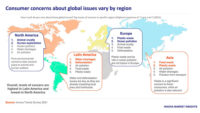Planetary Health: Consumer Concern for Sustainability Varies Around the Globe
Research suggests that levels of interest in sustainability are highest in the emerging markets of Asia and Latin America

Sustainability is a key consideration for the modern, conscious consumer. The topic is significant in more developed global economies while its importance is increasing in emerging markets. However, there can be regional differences in the focus of consumer interest, as outlined in a new report from Innova Market Insights.
The report demonstrates that overall interest in the environment is intensifying. In 2020, an average 21% of consumers globally said that environmental factors had become more important to them. Going into 2021, as many as one-third of respondents intend to improve their environmental impact over the year. Generally, consumers are becoming much more aware of the food they eat, where it comes from and its overall impact on the planet as well as carbon footprint.
The research suggests that levels of interest in sustainability are highest in the emerging markets of Asia and Latin America. This is most likely due to greater direct exposure to the adverse effects of environmental damage and climate change, as well as a lack of more sustainable choices in these regions. However, even in more developed economies, where there is a longer history of exposure to sustainable choices, there is still interest in doing more. In fact, in Europe, the health of the planet is of almost equal concern to the health of the population, even at a time when the COVID-19 pandemic has put health in sharpened focus. Indeed, for consumers in France and Germany, the health of the planet ranks above the health of the population, as a concern.
When it comes to specific sustainability issues, there are also clear geographical differences. For example, in Asia and Latin America, air pollution and water shortages are significant concerns. This is due to the existing impact they are having on local health and livelihoods. In a similar way, littering and landfill is of particular concern in Indonesia, reportedly home to the world’s largest landfill site. In contrast, plastic waste and ocean pollution are key issues in Europe following significant media coverage, and a general turning point in society’s focus on plastic’s impact on the planet and plastic alternatives.
The onus of responsibility for boosting sustainability is mainly placed on business and government. However, while over 80% of Latin Americans believe more should be done by industry and national leaders, this is below 60% in the US.
Understanding and helping to tackle environmental concerns in local markets, while supporting consumers who are seeking to improve their environmental impact, are ways in which companies can strengthen their sustainability strategies.
Agile brands and manufacturers around the world are ramping up their sustainability game as the demand for sustainable products continues to swell.
Looking for a reprint of this article?
From high-res PDFs to custom plaques, order your copy today!






